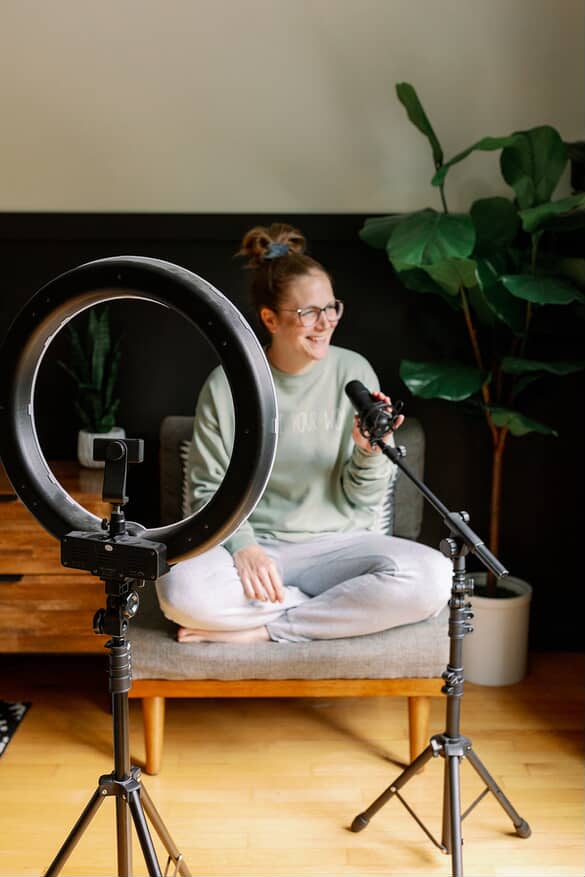I have a love for words and a knack for SEO – and as a mama, I know just how challenging it can be to run a business while raising a family. This blog is just one of the many resources you’ll find here that’ll help you boost your online visibility without sacrificing your sanity.
Thanks for being here (and I hope you’ll stick around).
Mckayla
categories
blogging
seo
Business
Six simple steps to better seo
download now
explore
case studies
to the shop
work with us
follow us on instagram
share
There’s a huge, outdated misconception that when you write a blog post, you don’t even have a chance of showing up in Google search results if you don’t write a minimum of 1,000+ words. It’s utter bullsh*t.
I won’t say there’s no correlation between the two; there can be, but there is no causation. More words do not equal better or higher rankings. So, no, word count does not directly affect your SEO.
Instead of worrying about hitting a minimum word count, focus on anything else—like maybe how much value you’re providing your reader, if your content is actually consumable (and they’re not left with a big ol’ headache after a few paragraphs), and how well the words you do write match the intent behind the search query (keyword) you’re targeting.
Why is it Recommended That You Write 2,500 Word Blog Posts?
The idea that you need 1,500 words, 2,500 words, or even 3,000+ words didn’t wasn’t just a rumor spread by some random blogger/SEO that just happened to stick—it was a legitimate recommendation and strategy.
Back in the first days of blogging, long-form (and I mean long-form) content was the key to ranking…But so were keyword stuffing and buying backlinks. The OG blog posts would break down every little question or concept related to the main keyword and would, quite literally, take the internet by storm.
A lengthy blog post could quickly outrank a shorter, more succinct one because Google didn’t have the same comprehension and analysis of consumer behavior as it does now. The posts weren’t ranking #1 because the readers found the information valuable but because Google deemed it valuable based on their pre-set algorithm.
Which is, very obviously, not the case now. From the mouth of the man himself, Joe Mueller, the Webmaster of Trends at Google, said, “Word count is not indicative of quality. Some pages have a lot of words that say nothing. Some pages have very few words that are very important & relevant to queries. You know your content best (hopefully) and can decide whether it needs the details.”
What is the Recommended Blog Length for SEO?
I don’t know – and not because I’m lacking in expertise, but because it’s going to be different on the query, keyword, niche, and your business/offers. For example, if you’re attempting to rank for “baby sleep tips” and you’re a pediatric sleep consultant, it’s going to look a bit different than if you’re a motherhood or parenting blogger. Both have good things to contribute, but a pediatric sleep consultant will – most likely – have more information that readers will want to see, while a mom blogger is working from experience and writing a personal story, which is typically shorter than a full educational/informative post.
The best advice I can give is to look at your competitors, think about what your audience wants (and needs), and what you have to offer.
Does Word Count Affect SEO? The Final Thoughts
Unless Joe Mueller makes an announcement saying all articles/blog posts should be XXX long, it’s going to stay a no, word count does not affect SEO. And, just in case you don’t take his word for it, take mine. One of my highest – and longest – ranking blog posts sit at 475 words. It ranks first for 37 targeted keywords and generates an average of 44 visitors per day, 319 per week, and 1.3k per month.
When considering which SEO practices you want to utilize in your strategy, ensure that you’re working from causation NOT correlation. There are thousands of misleading SEO techniques and practices that many experts swear by, but have precise evidence that it’s accurate or true.
Discover how you can increase your site traffic and attract your dream clients through SEO today with our SEO Support.
Reader Etiquette
© - Content and images in this blog are copyright this blog unless stated otherwise. Feel free to repost or share images for non-commercial purpose, but please make sure to link back to this website and its original post.
℗ - We do not store any information about your visit to our website other than for analytics and optimization for content and reading experience through the use of cookies.
c/o - Our site does at times contain paid advertisements, sponsored content, and/or affiliate links.
You might want to check these out too while you're at it
FREE Guide:
6 Simple Steps For Better SEO
INSTANTLY IMPROVE YOUR GOOGLE RANKING
Want to improve your website SEO in one afternoon? This free resource offers 6 actionable steps you can take in 15 minutes or less to instantly improve your SEO.
download now
categories
blogging
SEO
business
It's me, hi! Your SEO bestie.
get to know me
work with us
//
services
//
case studies
//
Mom of three, lover of all things blogging, and borderline obsessive coffee drinker — I also just happen to love making complicated things simple and accessible, especially when it comes to SEO. The blog is a collection of what I've learned from years of testing, trial and error, and working with amazing clients with impactful businesses (just like yours). Blogging and SEO doesn't have to be boring — and it definitely doesn't need to be difficult.



